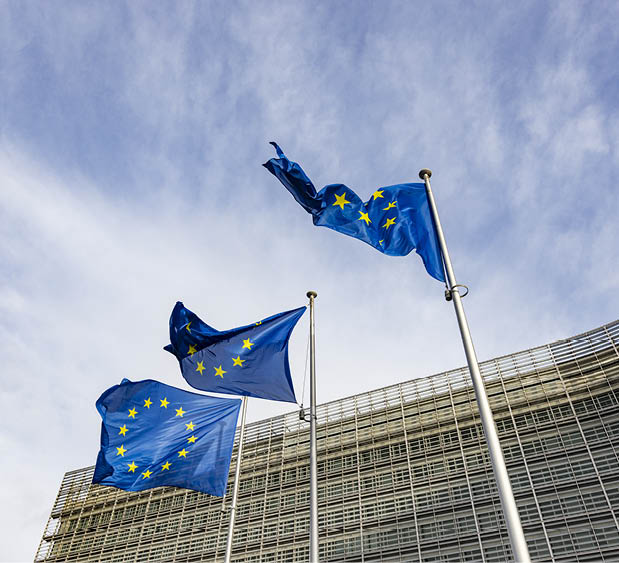-
Financial administration
An accurate financial administration provides you with the information you need to take the right decisions. The big advantage of a digital financial administration is that it provides insight into your most important financial processes at any time, whether this is the invoices, salary payments or bank changes.
-
Financial insight
You want to take the right decisions, based on trustworthy and clear management information. You want to have access to all your financial data, 24/7, in order to determine your position and be able to adjust where necessary.
-
Global compliance partnering
Outsourced compliance services comprises the total financial compliance of your business, in accounting, financial reporting, payroll, legal and various tax reporting obligations. We can make sure you don’t have to worry.

-
Impact House by Grant Thornton
Building sustainability and social impact. That sounds good. But how do you go about it in the complex world of stakeholders, regulations and frameworks and changing demands from clients and society? How do you deal with important issues such as climate change and biodiversity loss?
-
Business risk services
Minimize risk, maximize predictability, and execution Good insights help you look further ahead and adapt faster. Whether you require outsourced or co-procured internal audit services and expertise to address a specific technology, cyber or regulatory challenge, we provide a turnkey and reliable solution.
-
Cyber risk services
What should I be doing first if my data has been kidnapped? Have I taken the right precautions for protecting my data or am I putting too much effort into just one of the risks? And how do I quickly detect intruders on my network? Good questions! We help you to answer these questions.
-
Deal advisory
What will the net proceeds be after the sale? How do I optimise the selling price of my business or the price of one of my business activities?
-
Forensic & integrity services
Do you require a fact finding investigation to help assess irregularities? Is it necessary to ascertain facts for litigation purposes?

-
Auditing of annual accounts
You are answerable to others, such as shareholders and other stakeholders, with regard to your financial affairs. Financial information must therefore be reliable. What is more, you want to know how far you are progressing towards achieving your goals and what risks may apply.
-
IFRS services
Financial reporting in accordance with IFRS is a complex matter. Nowadays, an increasing number of international companies are becoming aware of the rules. But how do you apply them in practice?
-
ISAE & SOC Reporting
Our ISAE & SOC Reporting services provide independent and objective reports on the design, implementation and operational effectiveness of controls at service organizations.
-
Pre-audit services
Pre-audit services is all about making the company’s entire financial administration ready for checking before the external accountant begins his/her audit of the annual accounts.
-
SOx law implementation
The SOx legislation dictates that management is structurally accountable for reporting on the internal control relevant to the financial statements.

-
International corporate tax
The Netherlands’ tax regime is highly dynamic. Rules and the administrative courts raise new challenges in fiscal considerations on a nearly daily basis, both nationally and internationally.
-
VAT advice
VAT is an exceptionally thorny issue, especially in major national and international activities. Filing cross-border returns, registering or making payments requires specialised knowledge. It is crucial to keep that knowledge up-to-date in order to respond to the dynamics of national and international legislation and regulation.
-
Customs
Importing/exporting goods to or from the European Union involves navigating complicated customs formalities. Failure to comply with these requirements usually results in delays. In addition, an excessively high rate of taxation or customs valuation for imports can cost you money.
-
Human Capital Services
Do your employees determine the success and growth of your organisation? And are you in need of specialists which you can ask your Human Resources (HR) related questions? Human Resources (HR) related questions? Our HR specialists will assist you in the areas of personnel and payroll administration, labour law and taxation relating to your personnel. We provide you with high-quality personnel and payroll administration, good HR guidance and the right (international) advice as standard. All this, of course, with a focus on the human dimension.
-
Innovation & grants
Anyone who runs their own business sets themselves apart from the rest. Anyone who dares stick their neck out distinguishes themselves even more. That can be rather lucrative.
-
Tax technology
Driven by tax technology, we help you with your (most important) tax risks. Identify and manage your risks and become in control!
-
Transfer pricing
The increased attention for transfer pricing places greater demands on the internal organisation and on reporting.
-
Sustainable tax
In this rapidly changing world, it is increasingly important to consider environmental impact (in accordance with ESG), instead of limiting considerations to financial incentives. Multinational companies should review and potentially reconsider their tax strategy due to the constantly evolving social standards
-
Pillar Two
On 1 January 2024 the European Union will introduce a new tax law named “Pillar Two”. These new regulations will be applicable to groups with a turnover of more than EUR 750 million.
-
Cryptocurrency and digital assets
In the past decade, the utilization of blockchain and its adoption of a distributed ledger have proven their capacity to revolutionize the financial sector, inspiring numerous initiatives from businesses and entrepreneurs.
-
Streamlined Global Compliance
Large corporations with a presence in multiple jurisdictions face a number of compliance challenges. Not least of these are the varied and complex reporting and compliance requirements imposed by different countries. To overcome these challenges, Grant Thornton provides a solution to streamline the global compliance process by centralizing the delivery approach.
-
Expand into new markets
Do you seek for opportunities in the global business arena? Whether you are about to open a new office in a foreign country or considering an international acquisition, you need certainty of making the right choices for your company. Global expansion isn’t always as simple as it sounds. The good thing is that we’re here to help!
-
Expanding your business in the Netherlands
International expansion is an important step. The Netherlands can be your gateway to Europe for doing business abroad. But why you should choose the Netherlands?
-
Global contacts
Wherever you choose to do business, you want access to people with the best ideas and critical thinking that will enable you to grow your business at home and abroad.
-
Corporate Law
From the general terms and conditions to the legal strategy, these matters need to be watertight. This provides assurance, and therefore peace of mind and room for growth. We will be pro-active and pragmatic in thinking along with you. We always like to look ahead and go the extra mile.
-
Employment Law
Small company or large multinational: in any company your people are of the utmost importance for your business. Employment brings with it many issues in many areas and often has legal consequences. For big strategic, but also for more everyday questions about employment law, our lawyers are ready to help you out. Also for questions about international employment law. Do you have your own HR department? We’ll gladly assist them. We deliver bespoke services and are there when you need us.
-
Sustainable legal
Sustainability is more than a buzzword - it is the core of our legal advice towards sustainable success. From drafting sustainable contracts, integrating sustainable HR policies and ESG due diligence within our M&A practice to advising on ESG and other (national and international) legislation: we prefer to be pragmatic and proactive in helping your business.
-
Maritime sector
How can you continue to be a global leader? The Netherlands depends on innovation. It is our high-quality knowledge which leads the maritime sector to be of world class.


The legislative proposal focusses specifically on Dutch corporate income tax payers involved in international related party transactions, which do not correspond with the so called arm`s length principle. This legislative proposal could have an impact on various structures or transactions involving countries with a deviating or no arm`s length principle. Currently, the legislative proposal has been published for consultation. It is planned that the proposal will come into effect as of 1 January 2022.
Watch our video about transfer pricing mismatches
Background
According to the Dutch corporate income tax act, transactions between related parties should occur in accordance with the at arm`s length principle.
In case a transaction is not executed in accordance with the arm`s length principle, a downwards or an upwards transfer pricing adjustment takes place at the level of the Dutch corporate income tax payer via an informal capital contribution or a deemed dividend distribution. In case the country of the related counter party does not recognize such a transfer pricing adjustment, international mismatches may occur, which could result in a deduction without a pick up.
In April 2020, the advisory committee on the Taxation of Multinationals therefore recommended to revise the arm`s length principle in the Dutch tax law to tackle such mismatches. The Dutch Government was open to the suggestions to amend Dutch tax law and announced to publish a legislative proposal in 2021. This legislative proposal was eventually published by the Dutch government on 4 March 2021.
Scope of the proposal
Based on the legislative proposal, as of 1 January 2022, the taxable profit of a Dutch taxpayer cannot be adjusted downwards resulting from a transaction with another company if the taxable profit of the other company is not adjusted upwards accordingly. As a result the so-called ‘informal capital structures’ are countered.
The legislative proposal also provides for a rule regarding the onshoring of assets from a group company to the Netherlands. In case the transferring company does not have to adjust the sales price of these assets to a fair market value, the Netherlands will refuse to provide a step-up for the fair market value of the assets at the acquiring company.
Examples
In the example below, we will elaborate on the downwards adjustment with respect to an interest free loan provided from A ltd. to B BV, while the at arm`s length interest rate amounts to 5%.

Based on the consultation document the downward transfer pricing adjustment of the Dutch taxable profit at the level of B BV is only granted if there is a corresponding upwards adjustment at the level of A Ltd. As in the above example this is not the case hence the interest deduction at the level of B BV is denied.

In the next example we have the same situation, but in this case IP is transferred from A Ltd to B BV.
Transfer after 1 January 2022

As no corresponding adjustment takes place at the level of A Ltd. no step up to the fair market value at the level of B BV would be allowed. As a result less depreciation expenses can be deducted against the Dutch taxable profit of B BV.

Please note that the legislative proposal also applies to assets acquired from a related party at a non-arm`s length price in the five years preceding 1 January 2022. In this respect the step-up at the level of B BV remains granted, but the subsequent depreciation (downward adjustment) will be denied. For example if A Ltd transferred the IP on 28 February 2018 to B BV against a non-arm`s length price and no corresponding adjustment takes place at the level of A Ltd, the depreciation expenses that B BV can take into account on the transferred IP will be limited to the lowest of the following amounts:
i) Lower book-value of the asset that would have been taken into account based on this legislative proposal.
ii) The book-value of the asset before or after the start of the 2022 financial-year.
Sufficient taxation
In order to benefit from the downwards adjustment the Dutch corporate income tax payer must also demonstrate (besides the fact that there is an upwards adjustment) that the corresponding upwards adjustment is taxed at the level of the counterparty. This implies that if the counterparty if located in a country with a profit tax, the upwards adjustment should be included in the tax base. This requirement might also be met if the upwards adjustment is subject to a 0% taxation.
As such an international transaction with a counterparty located in a country that has a 0% profit tax should not be effected by this consultation document (under condition there is a corresponding upwards adjustment at the level of the counterparty). Please however note that in the final legislative proposal a minimum tax rate might be included.
Planning
Currently, the legislative proposal is open for consultation on the site of the Dutch tax authorities. The consultation period is ending soon after which the government will discuss the proposal and decide on implementing it or not. The proposal could be adjusted based on comments received during the consultation. We will keep you informed on any updates.
Way forward
With this legislative proposal in hand we recommend to assess if this would have an impact on your company. If so, we recommend to discuss the impact and how to proceed forward.
Questions
Do you have questions or do you need more detailed information? Please contact your contact person within Grant Thornton or Monique Pisters.







